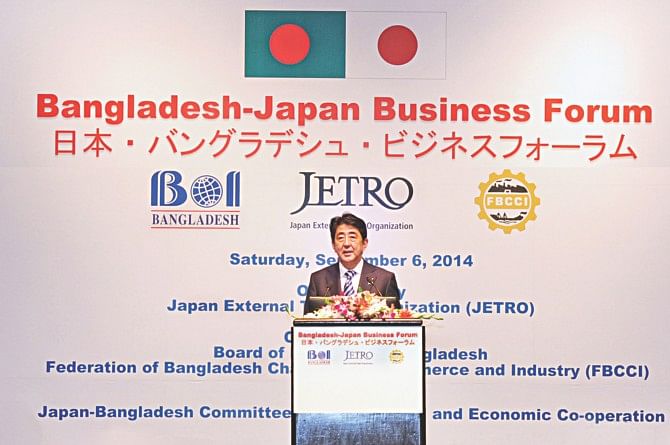Japanese CEOs view Bangladesh as next investment destination
Japanese CEOs view Bangladesh as next investment destination

Visiting Japanese business leaders yesterday demanded easing of investment rules as they look to divert funds to Bangladesh from China due to rising production costs and worker shortage there.
“We want to expand business in Bangladesh but we need policy support from the government,” said Kuniharu Nakamura, president and chief executive officer of Sumitomo Corporation, one of the top three sogo shosha companies in the world.
Japanese companies that trade in a wide range of products and materials are known as sogo shosha. In addition to acting as intermediaries, sogo shosha also engage in logistics, plant development and other services, as well as international resource exploration.
Sumitomo, which has been in Bangladesh since 1961, is interested in helping the country achieve its goal of becoming a middle-income country by 2021, he said.
“If the government wants, we can help with the construction of railways and industrial parks. We are fully committed to contribute to its growth,” he said, adding that the Japanese conglomerate has been providing scholarships since 1996 to 40 students in various faculties of Dhaka University.
Nakamura's comments came at the Japan-Bangladesh Business Forum at Sonargaon Hotel in Dhaka, attended by 22 CEOs and 65 other high officials of companies from Japan. They accompanied Japanese Prime Minister Shinzo Abe during his two-day visit.
The CEOs present were from: Marubeni, Ship Healthcare Holding, Maruhisa, Kanbe, JETRO, Mayekawa, Euglena, IHI, JFE Engineering Corporation, ITOCHU, Shimizu, Mitsubishi Heavy Industries, Toshiba, Toray Industries, Nippon Poly-Glu, Medical Corporation Otsubo-Kai, Obayashi, Mitsubishi UFJ Financial Group, Bonmax and Kume Sekkei.
During his presentation, Yukio Yamada, president and CEO of Kume Sekkei, one of the leading architectural design firms in Japan, said he is interested in providing technological and architectural support for railways, airport and industrial park.
Ichiji Ishuzu, executive director of Mayekawa, manufacturer of industrial refrigeration equipment and automated food processing robots, said his company is interested to set up food processing, beverage and ice-making machinery plants.
Kiminobu Hiraishi, president of Maruhisa that owns factories dealing with integrated knitting, dyeing, printing and sewing at Adamjee Export Processing Zone, demanded direct sea freight between Bangladesh and Japan for shortening lead-time.
Kunihisha Furukawa, CEO of Ship Healthcare Holding that is engaged in the medical product business, said he has plans to invest 2 billion yen in Bangladesh to expand his business in medical college and hospital.
Mitsuru Izumo, president of Euglena, a venture company that engages in selling health food and development of bio-fuel with its core technology for mass cultivation of “euglena”, said he wants to expand his operations in Bangladesh.
In April 2014, the company launched “Euglena GENKI Programme,” that distributes Euglena Nutrition Biscuits to children in Bangladesh.
Kazi Akram Uddin Ahmed, president of the Federation of Bangladesh Chambers of Commerce and Industry, said China, Vietnam, Cambodia, India and many Asian countries have benefited tremendously from Japanese investment.
“Similarly, we expect Japan will support us in reaching our vision 2021 target.”
The World Bank in its recent study on South Asia showed that Bangladesh needs to spend $7.4 billion to $10 billion a year until 2020 to bring its power grids, roads, and water supplies up to the standard needed to serve its growing population, said Mir Nasir Hossain, former FBCCI president.
The power sector, on the other hand, will require an investment between $11 billion and $16.5 billion to generate electricity needed for industrial growth and supporting the people at large, he said.
Sakhawat Hossain, managing director of Western Marine Shipyard Ltd, said his company has been building high-quality ships for different companies and countries worldwide.
Japan has turned into a major export destination for Bangladeshi products, thanks to an increased demand for apparel and leather items at competitive prices.
Exports from Bangladesh to Japan increased 14.90 percent year-on-year to $862.08 million in fiscal 2013-14, riding on the back of generalised system of preferences.
Bangladesh shipped garment products worth $572.27 million to Japan last fiscal year, up almost 20 percent from the previous year.